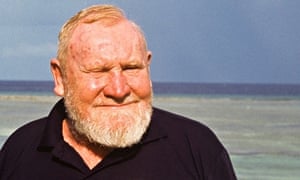The David Stoddart Society
Tuesday, January 26, 2016
Monday, January 25, 2016
Deeper Dives: Biodiversity, Carbon Storage, and "Natural Geoengineering"
We talked about the great potential of marine ecosystems, and particularly big charismatic marine vertebrates to enhance carbon storage in the oceans. Here is another article by Oswald Schmitz talking about the same thing over at the Yale e360 site:
How ‘Natural Geoengineering’Can Help Slow Global Warming. The key linkage here is something we've come to call "carbon conservation". The idea that ecosystem carbon storage and biodiversity conservation can be linked. Here Schmitz makes that link for both terrestrial and marine ecosystems in a popular article. Definitely worth a look.
How ‘Natural Geoengineering’Can Help Slow Global Warming. The key linkage here is something we've come to call "carbon conservation". The idea that ecosystem carbon storage and biodiversity conservation can be linked. Here Schmitz makes that link for both terrestrial and marine ecosystems in a popular article. Definitely worth a look.
Saturday, January 23, 2016
Deeper Dives: Managing the Commons
In class we'll get into a lot of discussions that will be informed by other literature, but that we'll not have time to discuss. But the sources and wisdom they contain are important. So, to that end, I'm creating the Deeper Dives posts. Papers and ideas that will take you into the literature and expose you to some important ideas surrounding the issues we are talking about.
The first Deeper Dive has to do with our discussion about managing the commons, and in particular managing fisheries. We've all heard of Garret Hardin's The Tragedy of the Commons (link here). It is based on the model of rational economic actors sharing a resource, and it points to an inevitable overuse of communal resources. We don't just use them, we use them up. Here is a great summary from Ostrom et al. 1999:
"At first, many people agreed with Hardin's metaphor that the users of a commons are caught in an inevitable process that leads to the destruction of the very resource on which they depend. The “rational” user of a commons, Hardin argued, makes demands on a resource until the expected benefits of his or her actions equal the expected costs. Because each user ignores costs imposed on others, individual decisions cumulate to a tragic overuse and the potential destruction of an open-access commons."

Looking more deeply into the problem, though, Orstom and colleagues (link here), come to a different conclusion, or at least a more nuanced conclusion. There are ways that lands have been managed communally for thousands of years that surpass both strict top-down, authoritarian control, or complete privatization. The talk about some big problems, including the one we're interested in, managing marine resources. Take a look at both of the papers. You'll be better scientists, conservationists, citizens, and conversationalists at dinner parties. (The picture from this post will make sense if you read the papers.)
The first Deeper Dive has to do with our discussion about managing the commons, and in particular managing fisheries. We've all heard of Garret Hardin's The Tragedy of the Commons (link here). It is based on the model of rational economic actors sharing a resource, and it points to an inevitable overuse of communal resources. We don't just use them, we use them up. Here is a great summary from Ostrom et al. 1999:
"At first, many people agreed with Hardin's metaphor that the users of a commons are caught in an inevitable process that leads to the destruction of the very resource on which they depend. The “rational” user of a commons, Hardin argued, makes demands on a resource until the expected benefits of his or her actions equal the expected costs. Because each user ignores costs imposed on others, individual decisions cumulate to a tragic overuse and the potential destruction of an open-access commons."

Looking more deeply into the problem, though, Orstom and colleagues (link here), come to a different conclusion, or at least a more nuanced conclusion. There are ways that lands have been managed communally for thousands of years that surpass both strict top-down, authoritarian control, or complete privatization. The talk about some big problems, including the one we're interested in, managing marine resources. Take a look at both of the papers. You'll be better scientists, conservationists, citizens, and conversationalists at dinner parties. (The picture from this post will make sense if you read the papers.)
Thursday, January 21, 2016
David Stoddart, A Life on the Reef
 This is a blog for BIO312, Ecology and Conservation Biology of Coral Reefs. Our main research site is Lighthouse Reef Atoll in Belize, and one of the enduring works of exploration and comprehensive geography and history is David Stoddart's 1962 monograph on the Atolls of Belize. Our goal is to embody that kind of wide-ranging enquiry, and so we started the David Stoddart Society.
This is a blog for BIO312, Ecology and Conservation Biology of Coral Reefs. Our main research site is Lighthouse Reef Atoll in Belize, and one of the enduring works of exploration and comprehensive geography and history is David Stoddart's 1962 monograph on the Atolls of Belize. Our goal is to embody that kind of wide-ranging enquiry, and so we started the David Stoddart Society.Dr. Stoddart died in 2014. His obituary gives history of a life lived in dedication to understanding coral reefs.
Subscribe to:
Comments (Atom)
